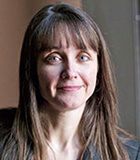Pharmacy faculty representing many disciplines took on a writing challenge that sparked conversations about the process and helped them inspire each other.
By Athena Ponushis
As a professor at the University of Minnesota College of Pharmacy, Dr. Kristin Janke has writing to do, but she also has students standing at her door and committee chairs waiting on reports. Janke, director of the Wulling Center for Innovation & Scholarship in Pharmacy Education, has heard other faculty members vent about this same scenario—dividing their attention between the urgency of daily responsibilities and the unrelenting worry of ‘Am I being published enough?’
Mentoring junior faculty and hearing how much they stress while their writing sits really brought the matter into focus for Janke: There’s a lot of pressure and guilt around writing in academic pharmacy, but not a lot of support or conversation about it. That was at the forefront of Janke’s mind as she participated in a writing challenge through the National Center for Faculty Development and Diversity that brought people of all disciplines from myriad institutions together to give focused attention to writing. Janke thought, “Why don’t we bring this to pharmacy?” And so, she did.
The #RxWritingChallenge drew more than 1,100 participants from more than 100 schools and organizations across 25 countries to write together this fall. Pharmacy faculty who work in the lab, at the bedside, in practice and in the classroom participated. They wrote about science, practice and education. They wrote 30 minutes a day for 14 days in October. They focused on writing so many words per session, sprinting to finish a project or practicing a writing skill. Pharmacists joined as individuals, using the challenge as a set time to make writing their priority. Faculty members joined with graduate students, modeling good habits as they wrote alongside each other. Authorship teams committed to the challenge together. All were encouraged by daily emails and writing webinars, as they empowered each other on Facebook and sent tweets about their successes. They started outlines, revised drafts, submitted manuscripts, experimented with their writing and found what works for them: a community.


 We tend to write on our own and then we never see anyone read it, so getting comments from our colleagues along the way and being able to talk with others about the challenges we’re facing energizes and rejuvenates us and keeps us focused on the task at hand.
We tend to write on our own and then we never see anyone read it, so getting comments from our colleagues along the way and being able to talk with others about the challenges we’re facing energizes and rejuvenates us and keeps us focused on the task at hand.